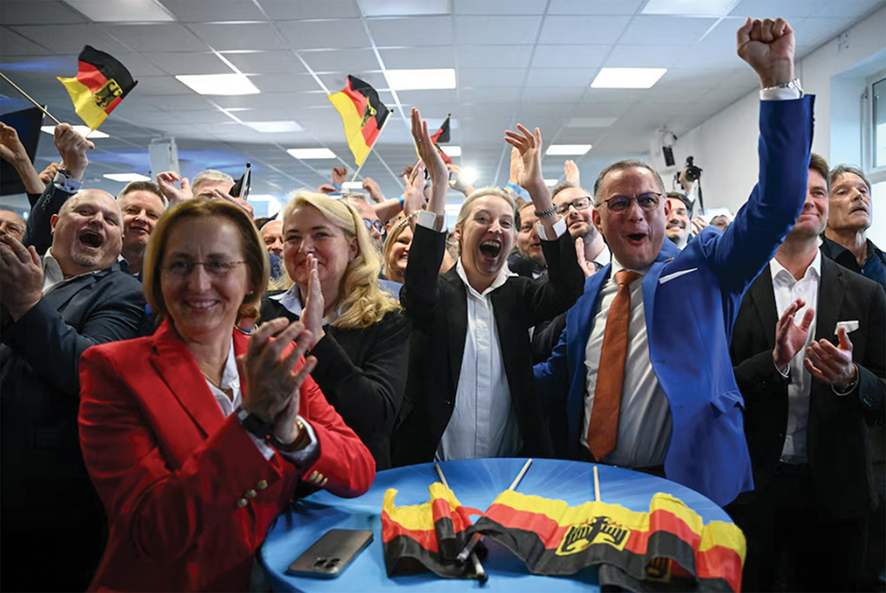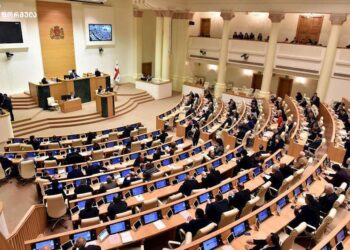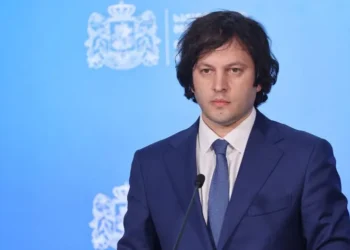This week, Radio Free Europe/ RL’s Georgian Service sat down with Daniel Foubert, Polish-French geo-economist, and founder of the international affairs consultancy Excalibur Insight, to discuss the European Parliament elections and the fallout for France, Germany, the EU, and Georgia.
Let’s begin with the winners and losers of the EP elections – The far right claim it was their victory, but how big a victory are we talking?
If you look at the seats in the parliament, it doesn’t translate into a significant change. The biggest change was that Marine Le Pen’s ID group got about 20 more seats, and that’s no way enough to clinch a majority. Von Der Leyen will probably be supported by ECR and Meloni, and she is not really a “far right,” is she? She’s a conservative and a kingmaker; she’s in the middle of everything. With that in mind, the victory that the far right claims won’t change much, it will just give them a bit more clout at negotiations.
But I think the big change is not at the level of the European Parliament. The biggest change, which will also affect the EU itself greatly, was at the national level – in France, where the elections produced a major political tsunami, one that I think will lead to the end of the Macron government. In each and every poll, their situation is worsening, and in the best case scenario, they will be forced to make an alliance with either the far right or left. I don’t even know how such a government would work, and this will affect them at both the national and EU level. Take the Ukraine war, for example. In all matters pertaining to Ukraine, now there will be a huge factor of Marine Le Pen being pro-Russian. And yes, I do remember she changed her stance several times. She did say the French shouldn’t blush about sending weapons to Ukraine, but a few months earlier, she was adamant France shouldn’t be involved at all. She only changed her tune once she saw it was going to happen regardless, so I don’t believe her and neither should anyone.
An equally disastrous scenario would be the Macron government aligning with the left – the French far-left is extremely pro-Russian, maybe more so than Le Pen. They are “anti-imperialist,” with a very specific meaning. For them, it means anti-USA, anti-NATO, anti-Western power. Western colonialism is bad, Russian colonialism is ok – the deeply rooted French communist tradition is probably also a factor in this perception.

How would you interpret Macron’s decision to call snap elections? What does he want to achieve?
Pretty much the same thing that Chirac achieved in 1997. He wants to give away the government, the problems, the responsibility, and subsequent blame to someone else. He can’t run for President for a third time, but he will stay on for another three years, and he is clever – he knows that’s more than enough time to destroy an opposition that has zero actual experience of governing the country. He will give them the keys to the country, and they will make a complete mess out of it. And then people will say, “hey, it wasn’t that bad when Macron and his people were in charge, they were in fact the good times.”
But this domestic political tsunami will also mean that the EU too will be a complete mess, without France, which will be pre-occupied with domestic matters first and foremost. Whether you like Macron or not, he had direction; he knew how to use the resources of his country in European matters; he had the European project in mind. Now there will be conflict, France will be all about national interests at the cost of any international cooperation. I have no idea what cooperation Le Pen might be interested in.
On to Germany, where we saw Chancellor Scholz’s Social Democrats suffer a crushing defeat. How will that translate into Germany’s domestic and foreign policy?
Scholz is going to have huge problems, because his coalition is very weak and getting even weaker. From the point of view of the foreign policy, Scholz has lost much of his credibility as a political leader; he isn’t seen as the face of Germany. He failed pretty much at everything he set out to do. He didn’t want to support Ukraine, systematically does everything he can to drag his feet and avoid sending more weapons, and yet, each time he gets pressured by Germans at home and partners abroad and has to do it regardless.
What impact will all this have on the Ukrainian war effort and the European assistance?
Again, a lot is going to depend on what’s happening in France. Is Le Pen going to behave like Scholz? Saying no at first, hesitating, but in the end, consenting? Or is she going to be a firm “No,” like Orban in Hungary? If I were to guess, I think the first option is more probable than the second, because once you are in power, you end up with a different strategy, with responsibilities. When you are in the opposition, you criticize, which is easier and has no cost attached. Once Le Pen is actually responsible for decision-making, and has to accept all responsibility for it, then I suspect she’ll sing a different tune.

And the impact on Georgia? With the far right on the rise, will it mean less staunch support for democratization, as opposed to more leeway to authoritarian, anti-western rhetoric like that of Georgia’s current government?
At first sight, the outcome of the elections could lead in one of two directions: Either the moderate parties will step up their support for Russia’s opponents to combat the Russian networks that support their own opponents, or they will try to woo the extremes by moderating their support. I think the Europeanist parties have come to understand (as Emmanuel Macron has), that no compromise or moderate strategy is possible, and that they must not cede any more ground to Russia, which is waging a relentless war against them.
The European Parliament, which has functioned on the basis of a consensus between the three major groups in the center, will continue to work with the European Commission, as it has up to now. So the question is once again whether the European Union’s support for the democratization of Georgia and Moldova will be blocked or not by France, which could act as Russia’s Trojan horse far worse than the Chancellor.
Interview by Vazha Tavberidze














